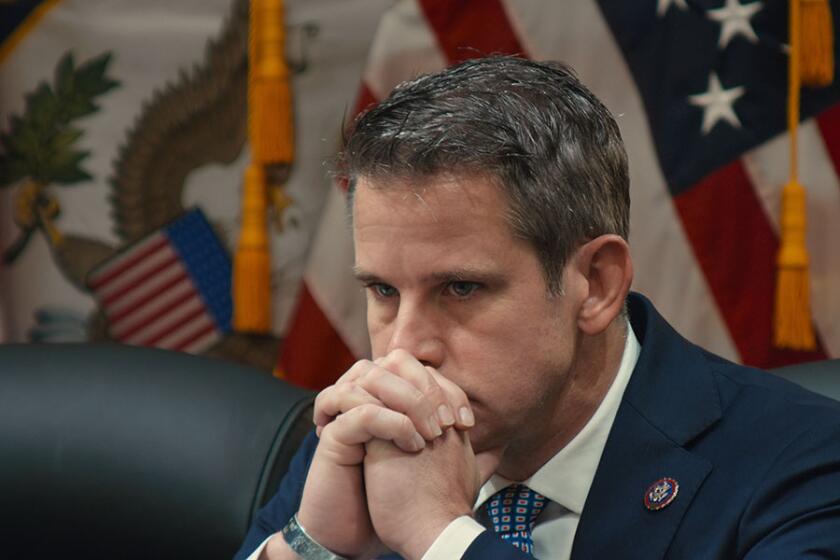Tough Gigs for Superheroes, Superpowers
Spider-Man and Uncle Sam have the same problem: They barely know their own strength. But as the movie “Spider-Man,” which opens Friday, reminds us, “With great power comes great responsibility.” That’s the challenge faced by superheroes and superpowers.
In the comic-book-turned-movie, Peter Parker is just an ordinary high school kid until he is bitten by a radioactivity-mutated spider. Thus, he is marked for destiny.
Although Spider-Man commits himself to righting wrongs, he never gets credit for his good deeds. As another character tells him, “In spite of everything you’ve done for them, eventually they will hate you.”
Uncle Sam must know the feeling.
Through the 19th century, the United States was a marginal country, far from the main global stage where the big countries--the international equivalent of jocks and cheerleaders--were at the center. The U.S. made a spectacular debut in 1917, when the idealistic President Woodrow Wilson led the nation into World War I, promising to abolish tyranny and establish what he called the League of Peace thereafter. Wilson’s early efforts at a new world order failed, but the U.S. rise to superpowerdom was only delayed, not derailed.
After Pearl Harbor, the United States donned the red-white-and-blue cape of world leadership and has never taken it off. The watershed event that stamped the U.S. as a country of unique might was the dropping of the atomic bomb on Hiroshima in 1945.
Today, the United States is, if anything, more dominant. The Washington-based Center for Defense Information calculates that the U.S. spends more on defense than the next 15 nations combined. Moreover, the Pentagon’s budget is 25 times as large as the combined military spending of the seven nations identified by the Pentagon as our most likely adversaries: Cuba, Iran, Iraq, Libya, North Korea, Sudan and Syria.
And surely our swift and virtually casualty-free victory in Afghanistan seems almost magical in the eyes of even hardened foreign observers. The U.S. has done the world a favor by defeating fascism and communism. But, as Spider-Man discovered, no good deed goes unpunished.
The 1958 novel by Eugene Burdick and William J. Lederer, “The Ugly American,” helped set the tone for subsequent criticism of our foreign policy. So although the nation has been by far the largest foreign-aid donor of the last half-century, critics reply that we give away a lower percentage of our wealth than other industrialized countries. Indeed, today it’s not hard to find an anti-American demonstration going on somewhere in the world--including here at home.
Most Americans probably find such feelings hard to fathom, but as John Adams observed two centuries ago, “Power always thinks it has a great soul and vast views beyond the comprehension of the weak.” In Adams’ time, that insight applied mostly to other countries; today, it applies mostly to us. Thus the slightest flick of Uncle Sam’s wrist can send countries and continents into commotion.
Hence the lonely conundrum of American power; in countries ranging from Vietnam in the 1960s to Iran in the ‘70s to Lebanon in the ‘80s to Somalia in the ‘90s, Uncle Sam proved unable to convince the locals that he was there to help them.
American strategists would do well to take the advice of the kindly Uncle Ben in “Spider-Man,” who reminds his mutantly powerful nephew, “Just because you can beat someone up doesn’t give you the right to.”
Polls show that many Americans would like to shuck off the mantle of world power. Spider-Man knows the feeling. As he says, “It wasn’t always like this. There was a time when life was a lot less complicated.” But even in his fantastic universe, there’s no turning back the clock. And so resigned to his arachnid-powered fate, he concludes: “This is my gift. This is my curse.”
And so we are left with Spider-Man atop a skyscraper, watching and waiting, powerful and yet also responsible. And so it is for Uncle Sam, the economic and military colossus. It’s lonely at the top, but he has no choice now but to remain on duty. Yet if our prudence matches our puissance, the story will have a happy ending.
More to Read
Only good movies
Get the Indie Focus newsletter, Mark Olsen's weekly guide to the world of cinema.
You may occasionally receive promotional content from the Los Angeles Times.










